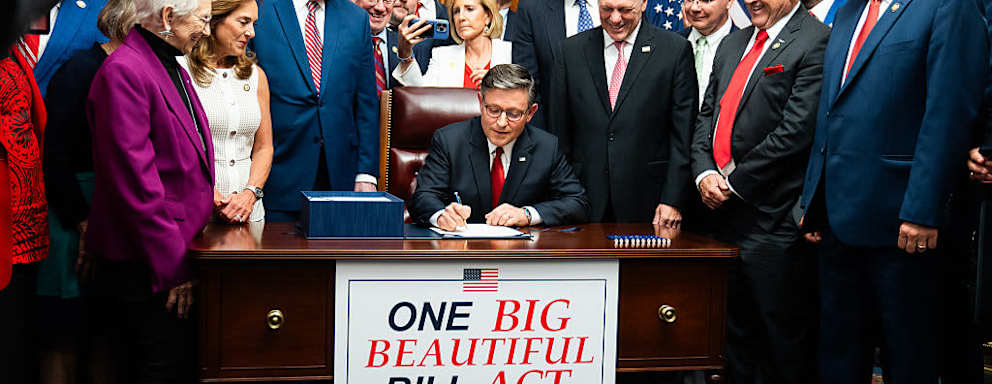Colleges’ Access to Federal Financial Aid Is Now Tied to Students’ Earnings. Here’s How It Could Impact Popular Degrees
 Credit: The Washington Post / Getty Images
Credit: The Washington Post / Getty Images- President Donald Trump signed the “One Big Beautiful Bill Act” into law on Friday, July 4.
- During the reconciliation process, the U.S. Senate added a measure that ties colleges’ access to federal student loans to students’ postgraduation earnings.
- Now, undergraduate programs must lead to better earnings than the median salary of a person with a high school diploma to pass the threshold.
- Associate programs could be hit hardest, early research suggests.
As researchers and advocates evaluate the effects of President Donald Trump’s One Big Beautiful Bill Act on higher education, preliminary studies show that one provision could impact popular associate programs and master’s degrees.
Under the sweeping new accountability measure, the Department of Education (ED) can cut off access to federal student loans for undergraduate degree programs that fail to lead to earnings better than the median pay of a working adult with just a high school diploma. Graduate programs must lead to earnings equal to the typical worker with a bachelor’s degree in the same field of study.
The U.S. Senate added the thresholds to the massive tax and spending bill, giving education experts little time to analyze the measure’s impact. However, early research shows that the new earnings thresholds could impact associate degree programs and some master’s degrees, raising concerns that it could slow the pipeline for professions such as teachers and social workers.

Stay in the Know!
Subscribe to our weekly emails and get the latest college news and resources sent straight to your inbox!
Degree-Level Impact of One Big Beautiful Bill Earnings Threshold
In late June, after the Senate added the threshold provision, the Urban Institute released a report suggesting that of all undergraduate programs, associate degrees from private, nonprofit institutions could see the most significant impact from the Senate’s earnings thresholds.
Jason Cohn, research associate at the Urban Institute, told BestColleges that his preliminary research shows that most bachelor’s and professional degree programs would pass the earnings threshold.
“Those sectors really passed the test at high rates and, for the most part, are not at risk,” he said.
But associate programs and master’s degrees are a different story.
Of programs with available data, the Urban Institute found that 12% of associate degree students attend programs that would fail the earnings threshold. Additionally, 3% of master’s students, with available data, attend a program that would fail the earnings test.
A breakdown from On EdTech found that 6% of students are in associate programs that would fail, and 3% of bachelor’s students are in programs that would fail.
A similar analysis from the American Enterprise Institute (AEI) also predicts that many associate programs could fail the Senate’s test.
According to AEI, just 34% of associate programs at public colleges would pass the earnings threshold. It’s worth noting, however, that AEI’s analysis includes earnings estimates from noncompleters, but the Senate revised its proposal to only include students who completed their program and earned a credential.
Want to be a teacher or social worker? Check out these degree programs:
Like the Urban Institute report, AEI predicts that most bachelor’s programs would pass the earnings threshold.
Cohn noted that associate programs tend to be less reliant on the federal student loan system due to the lower cost at community colleges. Therefore, even if some associate programs were to fail the earnings threshold, it may not be total doom and gloom.
Ed Venit, managing director at EAB, told BestColleges that this could force institutions to enhance their career services. If programs don’t want to lose access to federal student loans, they may funnel students more directly into high-paying jobs.
“It’s about placement,” Venit said, “and not leaving students to do it on their own.”
Program-Level Impact of Senate Proposal
Roxanne Garza, director of higher education policy at EdTrust, told BestColleges she worries about the impact the Senate’s proposal would have on necessary industries that historically don’t pay well. For example, could the earnings threshold unduly impact teacher education or social work programs?
“These are the fields that are definitely high value and in high demand,” Garza said, “but, for a variety of reasons, we as a society have decided we are not going to pay these people as well as they should be paid.”
The Urban Institute’s findings show these fears aren’t without merit.
For example, of the most popular associate fields of study, more than half (52%) of borrowers in teacher education programs are in programs that would fail the Senate’s earnings threshold.
| Field of Study | Share of Borrowers in Associate Program That Would Fail Earnings Threshold |
|---|---|
| Human development, family studies, related services | 85% |
| Health and medical administrative services | 63% |
| Human services | 60% |
| Teacher education, professional development | 52% |
| Business operations support and assistant services | 48% |
| Culinary arts and related services | 37% |
| Design and applied arts | 28% |
| Allied health and medical assisting services | 17% |
| Business administration, management and operations | 11% |
| Legal support services | 8% |
Of the 20 most popular master’s degrees, only one field of study has an earnings threshold fail rate above 50%: mental and social health services and allied professions.
Most master’s programs would pass the earnings threshold, as earnings are compared to those with a bachelor’s degree in the same field of study. Even social work, a field not known for high earnings, would pass the threshold in virtually all circumstances, according to the Urban Institute.
On EdTech’s analysis found that bachelor’s fine arts programs may struggle to meet the Senate’s earnings threshold.
Garza advocated for a more measured approach to earnings accountability.
She said the Senate’s proposal should be careful not to dissuade students from attending programs that serve a public good. Lawmakers should not be forcing these accountability measures into the reconciliation process on such short notice, she added.
“This is definitely not the ideal process to be doing large, comprehensive changes to higher education policy,” Garza said.
Venit of EAB added that there is a delay in the College Scorecard and earnings data. This means that even with the quick passage of the measure, colleges and universities will have a few years to make improvements — like expanding career advising services — that could increase postgraduation earnings.